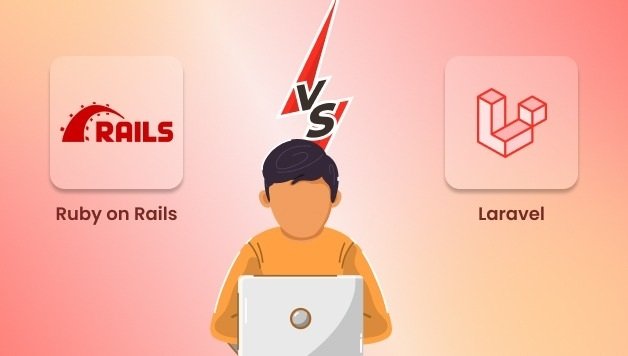When evaluating Rails or Laravel for backend development, it’s essential to understand their foundations. Ruby on Rails vs laravel is a mature MVC framework built with Ruby, known for its “convention over configuration” philosophy, which speeds up development by providing predefined structures.
Laravel, on the other hand, is a PHP-based MVC framework. It focuses on simplicity, elegant syntax, and a vast ecosystem of tools that make it popular for businesses looking for scalable and cost-effective solutions.
Development Speed and Ecosystem
Rails: Conventions and Rapid Prototyping
Rails excels in productivity. Startups and SaaS founders often choose it because:
- Built-in scaffolding accelerates MVP creation.
- Mature gems (libraries) reduce custom coding.
- Proven track record for building scalable SaaS platforms.
Laravel: Developer-Friendly Tools
Laravel appeals to a broader developer base due to:
- Blade templating engine for clean front-end integration.
- Out-of-the-box support for authentication, queues, and caching.
- Rich ecosystem including Laravel Forge, Vapor, and Nova.
This makes Laravel a strong contender for businesses seeking tailored web applications or cost-efficient solutions via Laravel development services.
Performance and Scalability Considerations
Rails Performance for Complex Apps
Rails is robust when handling complex, data-heavy applications. Its performance is optimized by mature caching mechanisms and background processing tools. However, hosting costs can be higher compared to PHP-based alternatives.
Laravel Scalability for Growing Businesses
Laravel provides strong scalability options with horizontal scaling on cloud infrastructure. Its asynchronous processing with queues ensures smooth handling of enterprise-grade workloads. While PHP may have overhead in extreme cases, Laravel remains a popular choice for mid-to-large scale apps.
Community, Resources, and Long-Term Support
Rails Community and Gems
Rails boasts a seasoned community that has contributed thousands of gems. The ecosystem is stable, but the growth rate of Ruby developers is slower compared to PHP.
Laravel Community and Packages
Laravel benefits from PHP’s massive developer pool and an actively growing community. With packages like Cashier, Horizon, and Sanctum, Laravel projects receive long-term support and continuous innovation.
When to Choose Rails vs When to Choose Laravel
Best Use Cases for Rails
- Rapid SaaS prototyping
- Marketplaces and platforms requiring speed
- Teams that prefer Ruby’s clean syntax
Best Use Cases for Laravel
- Custom enterprise web apps
- API-driven development
- Businesses seeking PHP-based scalability and cost efficiency
When comparing ruby on rails vs laravel, the decision depends largely on project goals, developer expertise, and hosting budgets.
Final Thoughts: Making the Right Framework Decision
The Rails or Laravel debate doesn’t have a one-size-fits-all answer. Rails delivers unmatched speed for startups, while Laravel offers flexibility and broader community support. A balanced choice comes down to your project’s scope, budget, and scalability requirements. For many businesses in 2025, the ruby on rails vs laravel discussion is less about framework popularity and more about aligning the technology stack with long-term business goals.







